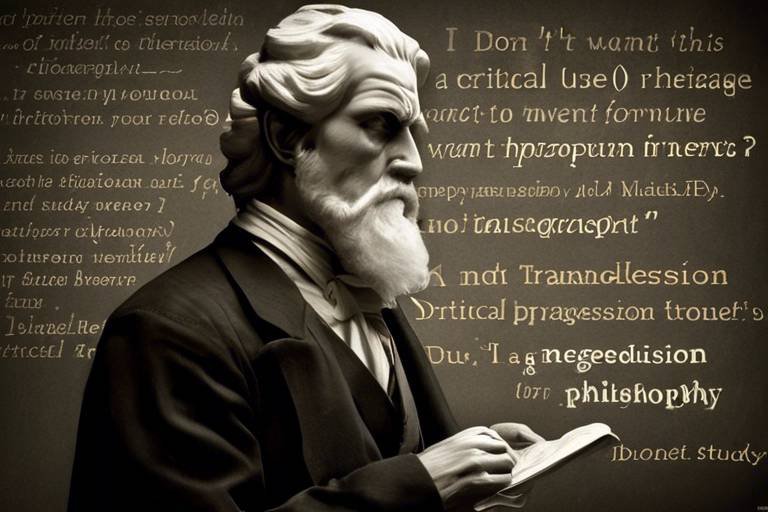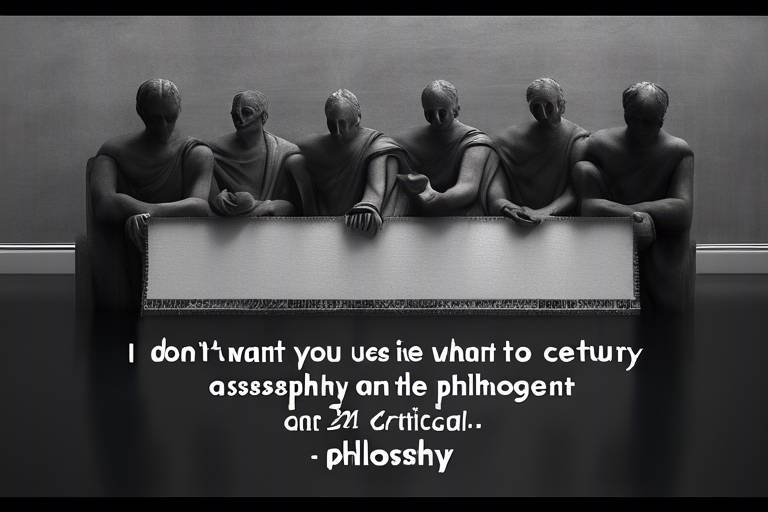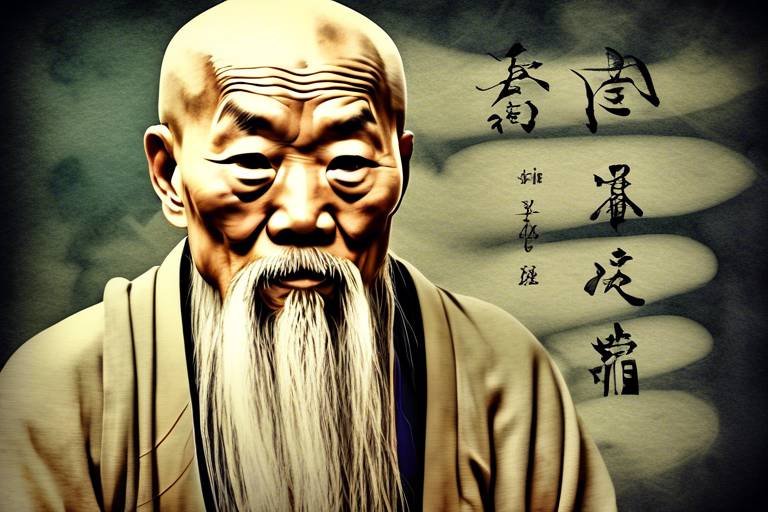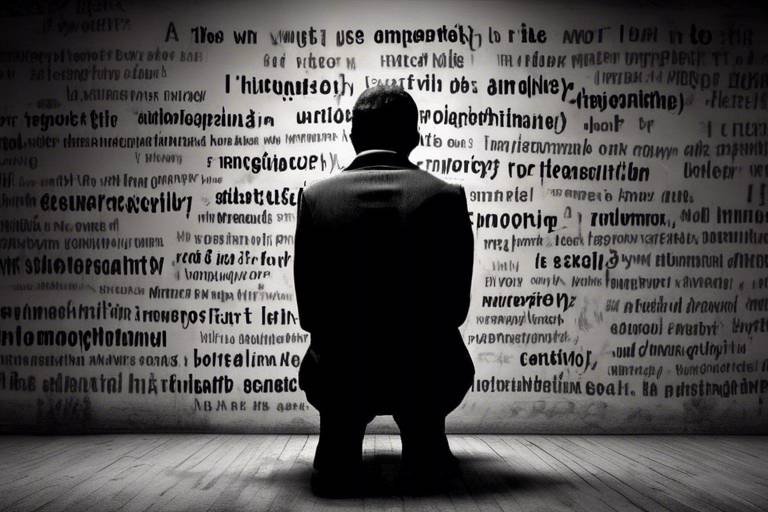The Existential Dilemma - To Be or Not To Be
Life is a fascinating journey filled with questions that often leave us pondering our very existence. The phrase "To be or not to be" encapsulates a profound philosophical inquiry that resonates with many of us. It forces us to confront the essence of our being and the choices we make. What does it truly mean to exist? Are we merely products of our circumstances, or do we have the power to shape our own destinies? This article dives deep into these existential waters, exploring the myriad perspectives on life, purpose, and the human condition.
Existentialism, as a philosophical movement, serves as a backdrop for our exploration. It emphasizes the importance of individual existence, freedom, and choice. But what does that really mean? Well, at its core, existentialism challenges us to reflect on our own existence and the choices that define us. It invites us to grapple with the uncomfortable truths about life, including our mortality and the uncertainty that accompanies it.
As we journey through the nature of being, we find ourselves asking questions that are both simple and complex. What does it mean to be? This inquiry transcends mere existence; it delves into the implications of our presence in the world. Philosophers, psychologists, and everyday individuals have all attempted to answer this question, each offering unique insights that contribute to our understanding of existence.
In the realm of philosophy, we encounter thinkers like Martin Heidegger and Jean-Paul Sartre, who have tackled the question of being in unique ways. Heidegger's ontology invites us to consider our relationship with the world and how our existence is intertwined with our surroundings. On the other hand, Sartre emphasizes the importance of individual freedom and responsibility, challenging us to take ownership of our choices and the essence of our being.
But it's not just philosophers who grapple with these questions; the implications of existence extend into our psychological well-being as well. The struggle with non-being, the fear of death, and the quest for meaning can significantly impact our mental health and personal identity. As we confront the reality of non-existence, we often find ourselves searching for significance in our lives, leading us to explore various avenues for fulfillment.
Ultimately, the exploration of existence and non-being encourages us to embrace life in all its complexities. It invites us to reflect on our own journeys and the choices that define us. As we navigate this existential landscape, we may find that the answers we seek are not as important as the questions we ask. So, are you ready to embark on this philosophical adventure? Let's dive deeper into the intricacies of existence!
- What is existentialism? Existentialism is a philosophical movement that focuses on individual existence, freedom, and choice, emphasizing the importance of personal experience and responsibility.
- Why is the question of existence important? The question of existence helps us understand our purpose, the nature of reality, and our place in the world, prompting deep reflection on life and choices.
- How do philosophers like Heidegger and Sartre contribute to our understanding of being? Heidegger explores our relationship with existence and the world, while Sartre emphasizes individual freedom and the responsibility that comes with it.
- What psychological implications arise from existential questions? Existential thoughts can influence mental health, personal identity, and the search for meaning, often leading to struggles with non-being and fear of death.

Understanding Existentialism
Existentialism is more than just a philosophical movement; it’s a deep dive into the essence of human existence. At its core, existentialism emphasizes the importance of individual experience, freedom, and the choices we make. It challenges us to confront the realities of our existence and to embrace the uncertainty that comes with it. Imagine standing at a crossroads, where every path represents a different choice, and the weight of those choices can be both exhilarating and terrifying. This is the essence of existential thought.
One of the fundamental tenets of existentialism is that existence precedes essence. This means that, unlike objects that are created with a predetermined purpose, humans are born without an inherent meaning. We are not defined by a specific role or function; instead, we create our own essence through our actions and decisions. This idea can be liberating, as it empowers us to shape our own destinies, but it can also lead to feelings of anxiety and despair as we grapple with the responsibility of our freedom.
Existentialism encourages us to ask profound questions about our lives. Questions like:
- What is my purpose?
- Am I truly free in my choices?
- How do I find meaning in a seemingly indifferent universe?
These questions are not just philosophical musings; they reflect the real struggles we face as we navigate life. Existentialists believe that by confronting these questions head-on, we can achieve a deeper understanding of ourselves and the world around us.
Another key aspect of existentialism is the concept of authenticity. To live authentically means to be true to oneself, to acknowledge one’s feelings, and to act in accordance with one’s values. In a world filled with societal expectations and pressures, finding authenticity can feel like an uphill battle. Yet, it is essential for a fulfilling existence. Think of it as peeling back the layers of an onion; each layer reveals more of who you are, but it can also bring tears as you confront uncomfortable truths.
Existentialism has been shaped by various thinkers, each contributing unique perspectives that enrich our understanding. From Søren Kierkegaard, who focused on the individual's relationship with faith and choice, to Friedrich Nietzsche, who challenged the very foundations of morality, the landscape of existential thought is vast and dynamic. These philosophers invite us to explore our existence in ways that resonate with our personal experiences.
In summary, understanding existentialism is about embracing the complexities of life. It’s about recognizing that while we are responsible for our choices, we also have the power to define our own existence. As we delve deeper into this philosophical movement, we uncover not only the challenges but also the profound opportunities for growth and self-discovery that come with confronting our existence.

The Nature of Being
The question of what it means to be is not just a philosophical inquiry; it's a deeply personal exploration that resonates with each of us. When we ponder our existence, we often find ourselves standing at the intersection of philosophy, psychology, and our everyday experiences. What does it mean to truly exist? Is it merely about breathing and living day-to-day, or is there a deeper significance that we often overlook? These questions invite us to delve into the essence of being, challenging us to consider our purpose and the impact we have on the world around us.
At its core, the nature of being can be understood through various lenses. From a philosophical standpoint, being refers to the state of existence itself—it's not just about being alive; it's about being aware of that existence. This awareness brings with it a responsibility to make choices, to define our paths, and to seek meaning in our lives. In psychology, the concept of being often intersects with our sense of identity and self-worth. It begs the question: how do we see ourselves in relation to others and the universe? This interplay shapes our mental health, influencing how we navigate challenges and embrace opportunities.
To further grasp the nature of being, let's consider the implications of existence in our daily lives. Imagine waking up each morning, feeling the warmth of the sun on your skin and the air filling your lungs. This simple act of being alive is intertwined with a multitude of experiences that contribute to our understanding of existence. We engage in relationships, pursue passions, and confront obstacles—all of which shape our sense of self. It's fascinating to think that our very existence is a tapestry woven from our choices, experiences, and interactions with others.
In exploring the nature of being, we can also look at how different cultures and philosophies interpret existence. For instance, some Eastern philosophies emphasize the interconnectedness of all beings, suggesting that our existence is not isolated but part of a larger whole. In contrast, Western philosophies often focus on the individual, celebrating personal freedom and the unique journey each person undertakes. This dichotomy highlights how our understanding of being can vary significantly based on cultural and philosophical backgrounds.
Ultimately, the nature of being challenges us to reflect on our lives and the legacy we wish to leave behind. Are we simply existing, or are we actively participating in the world around us? This reflection can lead to profound insights about our purpose and the significance of our actions. As we navigate our existential journeys, it becomes crucial to ask ourselves: what does it mean for me to truly be?
- What is the meaning of existence? The meaning of existence varies for each individual and can be influenced by personal beliefs, experiences, and cultural backgrounds.
- How does philosophy relate to the nature of being? Philosophy provides frameworks for understanding existence, exploring concepts such as freedom, choice, and the essence of life.
- Can understanding being improve mental health? Yes, reflecting on one's existence and purpose can lead to greater self-awareness and emotional well-being.
- What role do relationships play in our understanding of being? Relationships significantly influence our sense of self and belonging, shaping how we perceive our existence in the world.

be
This article explores the profound philosophical question of existence, examining various perspectives on life, purpose, and the human condition, ultimately delving into the essence of being and non-being.
Existentialism is a philosophical movement that emphasizes individual existence, freedom, and choice. This section will explore its key tenets and how they relate to the question of existence.
What does it mean to ? This question has puzzled thinkers for centuries and is central to our understanding of existence. To is not just to exist in a physical sense; it encompasses the awareness of our existence, our thoughts, feelings, and the relationships we forge with the world around us. In philosophy, being is often seen as the foundation of all reality, a state of consciousness that allows us to reflect on our lives, make choices, and find meaning. It’s like standing on the edge of a vast ocean, feeling both the thrill of the waves and the weight of the depths beneath. The essence of being invites us to explore not just the surface but also the underlying currents of our existence.
Different philosophers have tackled the question of being in unique ways. This subsection will highlight key thinkers and their contributions to our understanding of existence.
Heidegger's exploration of being focuses on the nature of existence and our relationship with the world. This part will summarize his key ideas and their relevance today.
Sartre's existentialism emphasizes individual freedom and responsibility. This section will discuss how his thoughts challenge traditional notions of being and non-being.
The question of existence also has profound psychological implications. This subsection examines how existential thoughts influence mental health and personal identity.
The concept of non-being raises questions about fear, despair, and the meaning of life. This section will explore the emotional and philosophical struggles associated with non-existence.
Fear of death is a central theme in existential thought. This subsection will discuss how this fear shapes human behavior and our understanding of existence.
In the face of non-being, individuals often seek meaning. This part will explore various ways people find purpose and significance in their lives.
The exploration of existence and non-being leads to a deeper understanding of life. This concluding section will summarize key insights and encourage readers to reflect on their own existential journeys.
- What is existentialism? Existentialism is a philosophical movement that focuses on individual existence, freedom, and choice, exploring how these elements shape our understanding of life.
- What does it mean to 'be'? To 'be' refers to the state of existence that encompasses awareness, consciousness, and the ability to reflect on one's life and choices.
- How do philosophers view being? Different philosophers have varied interpretations of being, with notable contributions from thinkers like Heidegger and Sartre, who explore existence's nature and implications.
- Why is the fear of death significant in existential thought? The fear of death is a central theme in existentialism as it drives individuals to seek meaning and understand their existence in a finite world.

? This section delves into the concept of being, exploring its implications in philosophy, psychology, and everyday life.
This article explores the profound philosophical question of existence, examining various perspectives on life, purpose, and the human condition, ultimately delving into the essence of being and non-being.
Existentialism is a philosophical movement that emphasizes individual existence, freedom, and choice. This section will explore its key tenets and how they relate to the question of existence.
What does it mean to be? This section delves into the concept of being, exploring its implications in philosophy, psychology, and everyday life.
At its core, the concept of being is a profound inquiry into our very existence. Philosophers have long debated what it means to be, leading to a rich tapestry of thought that spans centuries. In philosophy, being is not merely about physical existence; it encompasses the essence of what it means to live, to feel, and to engage with the world around us. Think about it: when you wake up in the morning, what compels you to rise? Is it the warmth of the sun, the promise of a new day, or perhaps the responsibilities that await you? Each of these elements reflects our understanding of being, intertwined with our choices and experiences.
In the realm of psychology, the implications of being take on a different tone. Our sense of self, shaped by our experiences, relationships, and emotions, plays a crucial role in our mental health. When we contemplate our existence, we often wrestle with questions of identity. Who are we? What defines us? This introspection can lead to both enlightenment and confusion, as we navigate the complexities of our thoughts and feelings. It's fascinating to consider how our perception of being can influence our mental state. For instance, individuals who embrace their existence with a sense of purpose often report higher levels of happiness and fulfillment.
On a practical level, the concept of being manifests in our everyday lives. The simple act of being present—truly present—in a moment can transform our experiences. Whether it's enjoying a meal, engaging in conversation, or simply taking a walk, being mindful allows us to connect more deeply with the world. In a society that often glorifies busyness, taking a moment to reflect on our being can be revolutionary. It reminds us that existence is not just about doing but about being—fully and unapologetically.
Different philosophers have tackled the question of being in unique ways. This subsection will highlight key thinkers and their contributions to our understanding of existence.
Heidegger's exploration of being focuses on the nature of existence and our relationship with the world. This part will summarize his key ideas and their relevance today.
Sartre's existentialism emphasizes individual freedom and responsibility. This section will discuss how his thoughts challenge traditional notions of being and non-being.
The question of existence also has profound psychological implications. This subsection examines how existential thoughts influence mental health and personal identity.
The concept of non-being raises questions about fear, despair, and the meaning of life. This section will explore the emotional and philosophical struggles associated with non-existence.
Fear of death is a central theme in existential thought. This subsection will discuss how this fear shapes human behavior and our understanding of existence.
In the face of non-being, individuals often seek meaning. This part will explore various ways people find purpose and significance in their lives.
The exploration of existence and non-being leads to a deeper understanding of life. This concluding section will summarize key insights and encourage readers to reflect on their own existential journeys.
- What is existentialism? Existentialism is a philosophical movement that focuses on individual freedom, choice, and the search for meaning in life.
- How does the concept of being affect mental health? The way we perceive our existence can significantly impact our mental health, influencing our sense of identity and overall well-being.
- Why is the fear of death important in existential thought? The fear of death prompts individuals to contemplate the meaning of life and their existence, often leading to deeper self-reflection.
- How can I find meaning in my life? Finding meaning often involves exploring personal values, passions, and relationships, and being present in the moment.

Philosophical Perspectives
When we dive into the realm of existence, we find ourselves surrounded by a rich tapestry of philosophical thought. Different philosophers have approached the question of being with unique insights, each contributing to our understanding of what it means to exist. At the heart of these discussions lies a fundamental inquiry: What does it truly mean to be? This exploration is not merely academic; it resonates with our everyday lives and the choices we make.
One of the most profound thinkers in this domain is Martin Heidegger. His work, particularly in "Being and Time," urges us to consider our relationship with the world around us. Heidegger posits that being is not just about existence in a physical sense but about our engagement with the world. He introduces the concept of Being-in-the-world, emphasizing that we are always situated within a context that shapes our understanding of ourselves and our existence. This perspective invites us to reflect: How does our environment influence our sense of self?
On the other hand, we have Jean-Paul Sartre, who takes a more radical approach. Sartre's existentialism is grounded in the idea of absolute freedom. He famously stated, "Existence precedes essence," which suggests that we are not defined by any predetermined nature or purpose. Instead, we are free to create our own essence through our choices and actions. This notion can be liberating yet daunting, as it places the weight of responsibility squarely on our shoulders. Sartre challenges us to confront the implications of our freedom: What does it mean to be responsible for our own existence?
Furthermore, we cannot overlook the contributions of Friedrich Nietzsche, who introduced the idea of the Übermensch or "Overman." Nietzsche's philosophy encourages individuals to transcend conventional morality and societal norms to create their own values. He provocatively asks, Is life inherently meaningful, or do we have the power to imbue it with meaning? This question pushes us to ponder the nature of our existence and the role we play in shaping it.
To summarize the philosophical perspectives on existence, we can look at the following key thinkers and their contributions:
| Philosopher | Key Concept | Core Idea |
|---|---|---|
| Martin Heidegger | Being-in-the-world | Our existence is intertwined with our environment. |
| Jean-Paul Sartre | Absolute Freedom | We define ourselves through our choices. |
| Friedrich Nietzsche | Übermensch | We create our own values and meaning. |
These philosophical explorations are not just abstract concepts; they challenge us to examine our own lives and beliefs. As we navigate through this existential dilemma, we are encouraged to ask ourselves: What do I believe about my existence? How do I define my purpose? By engaging with these ideas, we can gain a deeper understanding of our own lives and the choices we make, ultimately enriching our experience of being.

Heidegger's Ontology
Martin Heidegger, one of the most influential philosophers of the 20th century, delves deep into the concept of being in his seminal work, Being and Time. Heidegger's ontology is not just a dry academic exercise; it’s a profound exploration of what it truly means to exist. He invites us to ponder the question of being, which he believes has been largely overlooked by Western philosophy. Instead of giving us a straightforward definition, Heidegger challenges us to engage with our own existence and the world around us.
At the heart of Heidegger's thought is the idea of Dasein, a German term that translates to "being-there." Dasein refers to human existence and emphasizes our unique ability to question our own being. Unlike other entities in the world, humans are aware of their existence and can reflect upon it. This self-awareness is both a gift and a burden, as it brings with it the weight of responsibility and the inevitability of death.
Heidegger argues that to understand being, we must first confront our own mortality. This confrontation leads to a more authentic existence, where individuals embrace their freedom to make choices. He posits that many people live in a state of inauthenticity, where they conform to societal norms and expectations, losing touch with their true selves. By recognizing our finite nature, we can begin to live more genuinely, making choices that resonate with our true essence.
Moreover, Heidegger introduces the concept of being-in-the-world, which suggests that our existence is fundamentally intertwined with our environment and the people around us. We are not isolated beings; instead, our identity is shaped by our interactions and experiences. This interconnectedness highlights the importance of community and relationships in shaping who we are.
In summary, Heidegger's ontology invites us to rethink our understanding of existence. It challenges us to engage with our being, confront our mortality, and recognize our interconnectedness with the world. By doing so, we can move towards a more authentic way of living, one that embraces the complexity and richness of the human experience.
- What is Dasein? Dasein is a term used by Heidegger to describe human existence, emphasizing our unique ability to question and reflect on our own being.
- Why is mortality important in Heidegger's philosophy? Mortality is crucial as it prompts individuals to confront their existence, leading to a more authentic life.
- How does Heidegger view the relationship between individuals and their environment? Heidegger believes that our existence is fundamentally connected with the world around us, shaping our identity and experiences.

Sartre and Freedom
When we dive into the realm of existentialism, one name that stands out prominently is Jean-Paul Sartre. His philosophy revolves around the idea that existence precedes essence, which essentially means that we are not born with a predetermined purpose or nature. Instead, we are thrust into the world, and it is through our choices and actions that we define who we are. Sartre's thoughts challenge us to grapple with the weight of our freedom, suggesting that we are the architects of our own lives, responsible for every decision we make.
Sartre believed that with this freedom comes an overwhelming burden. Imagine being handed a blank canvas and a palette of colors, but no instructions on what to paint. This is akin to the human condition according to Sartre. We have the freedom to create our own meaning, but this freedom can also lead to feelings of anxiety and despair, as we confront the reality that our choices are entirely ours to bear. This profound responsibility is what Sartre termed “bad faith”, where individuals deceive themselves to escape the anxiety that comes from their freedom.
In Sartre's view, our existence is intertwined with others. He famously stated, "Hell is other people," highlighting how our interactions can complicate our pursuit of authenticity. We often find ourselves conforming to societal expectations, which can stifle our true selves. However, Sartre argues that embracing our freedom means acknowledging that we can choose how we respond to these external pressures. In a sense, we are always in a state of becoming, continuously shaping our identity through our choices.
To illustrate Sartre's ideas, consider the following table that outlines the key elements of his philosophy regarding freedom:
| Concept | Description |
|---|---|
| Existence precedes essence | We are born without a predetermined purpose; we create our own meaning. |
| Freedom | We have the ability to choose and define our identity, but this comes with responsibility. |
| Bad faith | Self-deception to avoid the anxiety that comes with absolute freedom. |
| Authenticity | Living in accordance with one's true self, despite societal pressures. |
Ultimately, Sartre's philosophy presents a double-edged sword. On one hand, the idea of freedom is exhilarating; it empowers us to take control of our lives. On the other hand, it can be terrifying to realize that we are solely responsible for our choices. This paradox is what makes Sartre's existentialism so relevant today. In a world filled with options and opportunities, we must continually confront the question: How do we want to define our existence?
- What does Sartre mean by "existence precedes essence"?
Sartre means that individuals are not born with a predefined purpose; rather, they create their own meaning through choices and actions. - How does Sartre's concept of freedom affect mental health?
The burden of freedom can lead to anxiety and despair, as individuals grapple with the weight of their choices and responsibilities. - What is "bad faith" in Sartre's philosophy?
Bad faith refers to the act of self-deception where individuals avoid the anxiety of freedom by conforming to societal expectations. - How can one live authentically according to Sartre?
Living authentically involves embracing one's freedom and making choices that align with one's true self, rather than succumbing to external pressures.

Psychological Implications
The question of existence is not just a philosophical musing; it profoundly impacts our psychological well-being. When we ponder the meaning of life and our place in the universe, we often encounter feelings that can be both enlightening and overwhelming. Existential thoughts can lead to a deeper understanding of ourselves, but they can also provoke anxiety, confusion, and a sense of despair. This duality raises important questions: How do these thoughts shape our mental health? What role does the quest for meaning play in our daily lives?
One of the key psychological implications of existential contemplation is the search for identity. In a world where traditional structures and beliefs are increasingly questioned, individuals may struggle to define who they are. This journey can be likened to wandering through a dense fog—sometimes you can see a few feet ahead, but often, the path is obscured. The search for identity often leads to feelings of isolation and existential angst, as people grapple with their existence and the choices they must make.
Moreover, the exploration of existence can trigger a range of emotional responses. For some, it can spark a profound sense of joy and liberation, as they embrace the freedom to create their own meaning. For others, it might lead to feelings of despair and hopelessness, especially when faced with the enormity of non-being. This emotional rollercoaster can manifest in various ways:
- Anxiety: The realization of our mortality and the uncertainty of existence can lead to heightened anxiety levels. People may find themselves preoccupied with thoughts of death and the unknown.
- Depression: A lack of meaning or purpose can contribute to feelings of sadness and hopelessness, sometimes culminating in depression.
- Existential Crisis: This term describes a state of confusion about one's purpose and direction in life, often triggered by significant life events or transitions.
Interestingly, existential thoughts can also serve as a catalyst for personal growth. Many individuals find that confronting these uncomfortable questions leads them to develop a stronger sense of self and a clearer understanding of their values. It's akin to a phoenix rising from the ashes; through the struggle with existential concerns, people often emerge more resilient and better equipped to face life's challenges.
In therapy, exploring existential themes can be a powerful tool. Therapists often encourage clients to delve into their beliefs about existence, death, and meaning. This exploration can foster a sense of empowerment, as individuals learn to navigate their fears and uncertainties. By acknowledging and embracing these existential questions, clients can cultivate a more profound sense of purpose and direction in their lives.
Ultimately, the psychological implications of existential thought are complex and multifaceted. They can lead to both turmoil and triumph, forcing us to confront our deepest fears while also offering the potential for profound personal insight. As we navigate our own existential journeys, it’s crucial to remember that these struggles are a universal part of the human experience. Embracing the discomfort of existence may just be the key to unlocking our true potential.
- What is existentialism?
Existentialism is a philosophical movement that emphasizes individual existence, freedom, and choice, focusing on the unique experiences of each person. - How does existential thought impact mental health?
Existential thoughts can lead to anxiety and depression but can also foster personal growth and a stronger sense of identity. - Can therapy help with existential concerns?
Yes, therapy can provide a safe space to explore existential questions, helping individuals find meaning and purpose in their lives.

The Struggle with Non-Being
The concept of non-being is not just a philosophical abstraction; it resonates deeply within our emotional and psychological landscape. When we think about non-being, we often grapple with the fear of emptiness, the void that lurks behind our conscious thoughts. This struggle is universal, touching every human heart at some point, and it raises profound questions about the nature of existence itself. What does it mean to not exist? Can we truly comprehend the absence of being? These questions can lead us down a rabbit hole of introspection, forcing us to confront our deepest fears and insecurities.
One of the most significant aspects of this struggle is the fear of death. Death is often viewed as the ultimate form of non-being, the end of our experiences, relationships, and aspirations. This fear can manifest in various ways, influencing our behaviors and choices. For instance, some people may become risk-averse, avoiding situations that remind them of their mortality. Others might embrace life more fully, seeking out adventures and experiences as a way to combat the dread of oblivion. The paradox here is striking: in our attempts to escape non-being, we often find ourselves more alive than ever.
Moreover, the struggle with non-being can lead to a profound sense of existential despair. When individuals contemplate the futility of life and the inevitability of death, they may feel overwhelmed by a sense of hopelessness. This despair can be paralyzing, leading to feelings of isolation and insignificance. However, it's essential to recognize that this struggle can also be a catalyst for personal growth. By confronting our fears head-on, we can develop a deeper understanding of ourselves and our place in the universe.
In the face of non-being, many people embark on a quest for meaning. This search can take various forms, from spiritual exploration to creative expression. Here are some common avenues through which individuals find purpose:
- Spirituality: Many turn to religion or spirituality as a way to grapple with the idea of non-being, seeking comfort in the belief of an afterlife or a greater cosmic order.
- Creativity: Artistic expression allows individuals to channel their feelings about existence and non-existence into something tangible, creating beauty from the chaos of life.
- Relationships: Building connections with others can provide a sense of belonging and significance, reminding us that we are not alone in our struggles.
Ultimately, the struggle with non-being is a fundamental aspect of the human experience. It challenges us to reflect on our values, beliefs, and aspirations. While the fear of non-being can be daunting, it also serves as a powerful reminder of the fragility and preciousness of life. By embracing this struggle and seeking to understand it, we can cultivate a richer, more meaningful existence.
| Question | Answer |
|---|---|
| What is non-being? | Non-being refers to the absence of existence, often associated with concepts of death and emptiness. |
| How does fear of death relate to non-being? | The fear of death is a central theme in existential thought, as it represents the ultimate form of non-being. |
| Can struggling with non-being lead to personal growth? | Yes, confronting the fear of non-being can lead to a deeper understanding of oneself and a more meaningful life. |
| What are some ways to find meaning in life? | Individuals often find meaning through spirituality, creativity, and building relationships with others. |

Fear of Death
The is a gripping concept that has haunted humanity since time immemorial. It's that nagging thought at the back of our minds that makes us question our very existence. Why do we fear death? Is it the unknown that lies beyond, or is it the thought of leaving everything we know behind? This fear can manifest in various ways, shaping our behaviors, choices, and even our relationships. It’s almost as if death is a shadow that looms over us, constantly reminding us of our mortality and the impermanence of life.
Philosophers and psychologists alike have delved into this existential anxiety, trying to unravel its complexities. For many, the can lead to profound existential crises. It prompts us to ask questions like: What is the purpose of life? Are we merely here to exist, or do we have a deeper reason for being? These questions can stir a whirlwind of emotions, leading to feelings of despair, anxiety, and sometimes, even a sense of liberation.
Interestingly, the fear of death can also serve as a catalyst for personal growth. When faced with the reality of our mortality, many individuals find themselves reassessing their priorities and values. They begin to cherish life more deeply, embracing each moment with a newfound appreciation. It’s as if the awareness of death acts as a reminder to live authentically and purposefully. This paradox is beautifully captured in the words of the existentialist philosopher Martin Heidegger, who suggested that confronting our mortality can lead to a more meaningful existence.
Moreover, this fear can lead to various coping mechanisms. Some may turn to religion or spirituality, seeking comfort in the belief of an afterlife. Others might immerse themselves in their work or hobbies, attempting to distract themselves from the inevitable. However, it’s essential to recognize that while these coping strategies can provide temporary relief, they often do not address the underlying fear. Instead, engaging with this fear directly can be a more transformative approach.
For those grappling with the fear of death, it can be helpful to explore these feelings in a supportive environment. Whether through therapy, philosophical discussions, or even journaling, acknowledging this fear can pave the way for a more profound understanding of oneself. As we navigate through life, it becomes evident that the fear of death is not just about the end; it’s about how we choose to live in the face of that reality.
In summary, the fear of death is a complex, multifaceted issue that intertwines with our understanding of existence. By confronting this fear, we not only gain insight into our own lives but also open the door to a more profound appreciation for the time we have. After all, it’s the awareness of our mortality that often inspires us to make the most of our fleeting existence.
- Why do we fear death? The fear of death often stems from the unknown and the uncertainty of what happens after we die.
- Can the fear of death lead to personal growth? Yes, confronting the fear of death can motivate individuals to live more authentically and pursue meaningful experiences.
- Is it normal to fear death? Absolutely! Fear of death is a common human experience that many people grapple with at some point in their lives.
- How can I cope with my fear of death? Engaging in open discussions, seeking therapy, or exploring philosophical readings can help individuals process their fears.

Finding Meaning
In the face of non-being, the quest for meaning becomes not just a philosophical exercise, but a deeply personal journey that shapes our very existence. Many of us grapple with the **existential void**, wondering how to fill it with purpose and significance. The search for meaning is akin to a treasure hunt, where each clue leads us closer to understanding ourselves and our place in the universe. But what does it really mean to find meaning in life?
Finding meaning can manifest in various ways, often influenced by our personal experiences, beliefs, and values. For some, it may involve **relationships**—the connections we forge with family, friends, and even pets. These bonds can provide a sense of belonging and purpose, reminding us that we are part of something larger than ourselves. For others, meaning might be discovered through **creative expression**, whether that’s through art, writing, or music. These outlets allow us to channel our emotions and thoughts into something tangible, giving voice to our inner struggles and triumphs.
Moreover, many people find meaning through **service to others**. Volunteering or helping those in need can create a profound sense of fulfillment, as it shifts our focus from our own existential dilemmas to the well-being of others. This act of giving not only enriches the lives of those we help but also adds layers of significance to our own lives. It’s a beautiful paradox: by losing ourselves in the service of others, we often find ourselves.
However, the journey to uncovering meaning isn't always straightforward. It can be riddled with obstacles, doubts, and moments of despair. The key is to remain open to exploration. Here are a few avenues that might help illuminate your path:
- Self-Reflection: Take time to ponder your values, passions, and what truly matters to you. Journaling can be a powerful tool in this process.
- Seek New Experiences: Stepping out of your comfort zone can lead to unexpected insights and opportunities for growth.
- Engage in Conversations: Discussing existential questions with others can provide new perspectives and inspire you to think differently.
Ultimately, finding meaning is a deeply personal endeavor, and what resonates with one person may not resonate with another. It’s essential to embrace the **fluidity** of this journey, recognizing that meaning can evolve over time as we grow and change. Like a river that carves its way through the landscape, our understanding of purpose can shift, adapting to new experiences and insights.
As we navigate this existential labyrinth, let’s remember that the pursuit of meaning is not a destination, but a journey. Each step we take, each question we ponder, brings us closer to understanding the essence of our existence. So, let’s embrace the uncertainty and allow ourselves to explore the myriad paths that lead to a more meaningful life.
1. What is the significance of finding meaning in life?
Finding meaning is crucial as it provides a sense of purpose and direction, helping us navigate life's challenges and uncertainties.
2. How can I start my journey to find meaning?
Begin with self-reflection, explore your passions, and engage in activities that resonate with you. Don’t hesitate to seek out new experiences.
3. Is the search for meaning a lifelong process?
Yes, the search for meaning can evolve throughout your life as you encounter new experiences, relationships, and challenges.
4. Can helping others contribute to finding meaning?
Absolutely! Serving others often enriches our lives and provides a sense of fulfillment and connection to the larger community.

Conclusion: Embracing Existence
As we journey through the complexities of life, the exploration of existence and non-being offers us profound insights into our own realities. It's easy to get lost in the chaos of daily life, but when we take a moment to reflect on the essence of our being, we uncover layers of meaning that often go unnoticed. Embracing existence isn't just about acknowledging our physical presence; it's about recognizing the depth of our experiences and the richness of our emotions.
Throughout this article, we have delved into various philosophical perspectives, from the existential thoughts of Heidegger and Sartre to the psychological implications of our existence. These insights remind us that life is not merely a series of events, but a tapestry woven with choices, responsibilities, and the quest for meaning. In essence, to embrace existence is to accept the freedom that comes with it, even when faced with the daunting concept of non-being.
In the face of existential questions, we often find ourselves asking, "What is my purpose?" or "How do I find meaning in a seemingly indifferent universe?" The truth is, meaning is not something we discover; it's something we create. Each of us has the power to shape our own narratives, to find significance in the mundane, and to forge connections with others. This is where the beauty of existence lies—in the relationships we cultivate and the impact we leave behind.
As we conclude this exploration, it's essential to encourage a mindset of reflection and openness. Consider the following as you embrace your existence:
- Reflect on Your Values: What truly matters to you? Understanding your core values can guide your choices and actions.
- Engage in Meaningful Relationships: Surround yourself with those who uplift and inspire you. Connection is a vital aspect of existence.
- Seek Personal Growth: Embrace challenges as opportunities for growth. Each experience contributes to your unique journey.
Ultimately, the journey of embracing existence is ongoing. It's a dance between being and non-being, a constant negotiation of our fears and aspirations. So, take a deep breath, embrace the uncertainties, and remember that your existence is a gift—one that is worth celebrating every single day.
1. What is the main idea behind existentialism?
Existentialism focuses on individual existence, freedom, and choice, emphasizing that individuals are responsible for giving their own lives meaning.
2. How can I find meaning in my life?
Finding meaning often involves reflecting on your values, building meaningful relationships, and embracing personal growth through challenges.
3. Why do we fear death?
Fear of death is a common existential concern, often rooted in the uncertainty of what lies beyond and the instinctual desire to survive.
4. How do philosophers like Heidegger and Sartre contribute to our understanding of existence?
Heidegger explores the nature of being and our relationship with the world, while Sartre emphasizes individual freedom and responsibility, challenging traditional notions of existence.
Frequently Asked Questions
-
What is existentialism?
Existentialism is a philosophical movement that focuses on individual existence, freedom, and choice. It emphasizes the importance of personal experience and responsibility in shaping one's life, encouraging individuals to find their own meaning and purpose.
-
How do philosophers define 'being'?
'Being' refers to the state of existence or the essence of what it means to exist. Philosophers like Martin Heidegger and Jean-Paul Sartre have explored this concept, discussing how our understanding of being influences our perception of the world and our place within it.
-
What are the psychological implications of existential thoughts?
Existential thoughts can significantly impact mental health, often leading to feelings of anxiety, despair, or a search for meaning. They challenge individuals to confront their fears, particularly the fear of death, and encourage personal growth through self-reflection.
-
Why do we fear non-being?
The fear of non-being, or death, is a central theme in existential philosophy. This fear can drive human behavior, influencing our choices and relationships as we seek to find meaning and significance in our lives amidst the uncertainty of existence.
-
How can individuals find meaning in life?
People find meaning in various ways, such as through relationships, creative expression, personal achievements, or spiritual beliefs. Engaging in activities that resonate with one's values and passions can foster a sense of purpose and fulfillment.
-
What is the significance of embracing existence?
Embracing existence allows individuals to accept the complexities of life, including its challenges and uncertainties. By reflecting on their own existential journeys, people can cultivate a deeper understanding of themselves and their place in the world, leading to a more meaningful life.



















